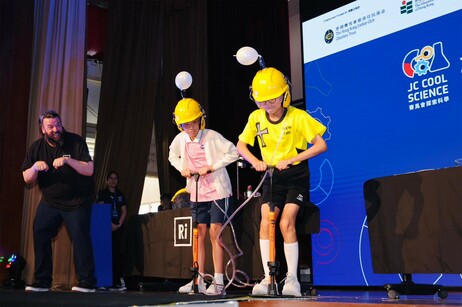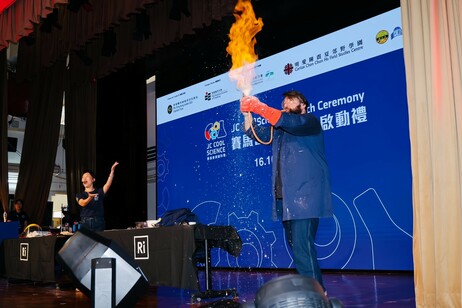The First Large-scale Inquiry-based Science Learning Programme for Primary Schools in Hong Kong — “JC CoolScience” — Officially Launched
To foster students’ interest and literacy in science, enhance primary school teachers’ pedagogical capacity, and align with the new science curriculum introduced by the Education Bureau, “JC CoolScience” — created and funded by The Hong Kong Jockey Club Charities Trust in partnership with The Education University of Hong Kong (EdUHK) — provides comprehensive support for both teachers and students. Funded by a donation of over HK$265 million from The Hong Kong Jockey Club Charities Trust, the project is Hong Kong’s first large-scale inquiry-based learning initiative in science education.
A launch ceremony was held on 16 October, with officiating guests including May Chan, Permanent Secretary for Education of the HKSAR Government; Ann Kung, Steward of The Hong Kong Jockey Club; and Professor John Lee Chi-Kin, President of EdUHK, together with other distinguished guests.
Echoing the national development strategy of “invigorating the country through science and education”, JC CoolScience is a four-and-a half-year project to be implemented in 120 primary schools across Hong Kong. It is expected to benefit 30,000 students and provide professional training and community support for 500 teachers.
As a strategic partner, the EdUHK’s Department of Science and Environmental Studies – represented by Professor Keith Ho Wing-kei, Head of the Department, and Professor Winnie So Wing-mui, Professional Advisor to the project – is responsible for the project’s curriculum design, development of teaching resources, professional training for teachers, and school support. Collaborating with institutions such as Beijing Normal University and the Smithsonian Science Education Center, the team has developed evidence-based teaching materials tailored to the local curriculum. JC CoolScience offers 300 minutes of primary science enrichment modules that guide students from observation and inquiry to exploration and discovery, cultivating scientific thinking and self-directed learning. The team has also developed a series of inquiry-based learning units addressing local science and environmental issues, integrating scientific inquiry with real-life Hong Kong contexts to strengthen teachers’ professional competence in learning, teaching, and assessment. Additionally, the project’s upgraded EdUHK Eco-Garden offers students a dynamic learning environment where nature and science intersect, extending inquiry-based learning beyond the classroom.
The Eco-Garden is just one example of how the project partners with local organisations to enrich experiential learning beyond the classroom by upgrading facilities and destinations. Other examples are the Caritas Chan Chun Ha Field Studies Centre, the Ho Koon Nature Education cum Astronomical Centre by Sik Sik Yuen, and Hong Kong Wetland Park. Through science shows, competitions, and workshops, the project aims to inspire students and the wider community to engage with science with curiosity and enthusiasm. Additionally, the project offers structured training and practical guidance to strengthen science teaching. Outstanding educators will have opportunities for immersive study visits to the Chinese Mainland and overseas, bringing global insights into local classrooms. By fostering teacher learning communities, the project promotes knowledge sharing and drives innovation in primary science education across Hong Kong.
The ceremony also featured an engaging experiment presented by Dan Plane, Head of Science Demonstration at The Royal Institution of Great Britain. Through lively interactive experiments, Dan explained scientific principles, captivating students and highlighting the excitement and appeal of inquiry-based learning.
Representatives from project pilot schools, Baptist (STW) Lui Ming Choi Primary School and S.K.H. Holy Spirit Primary School, also shared their early successes from the programme, demonstrating how inquiry-based learning is transforming learning and teaching practices.
For more details about the programme, please visit: https://www.jccoolscience.org
-Ends-









